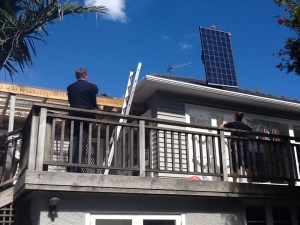Podcast: Play in new window | Download | Embed
What’s the difference between resilience and sustainability? Is there a place for both? Is it even really that important?
The utter darkness while driving around east Auckland early last Sunday reminded me of the similarly eerie calm we experienced while driving around Christchurch on February 23rd, 2011.
A 21st century city without electricity is a very different and disabled place. And being without power is now more than just an inconvenience. A prolonged blackout can mean significant financial loss, or worse.
The Power of Solar
The Cutler-Welsh household was grateful to be with power on Sunday. This wasn’t because our suburb was one of the first to be fixed following the sub-station fire that disrupted the power supply to 85,000 households. Our house was an island of functioning lights, internet and refrigeration in an otherwise dark, quiet neighbourhood and our resilience was due to the solar photovoltaic (PV) panels on our roof.

From Sustainability to Resilience
We installed solar on our roof in Auckland for a similar reason that we added rainwater harvesting barrels to our home in Christchurch – to be more sustainable. We’re able to reduce our impact by collecting and storing some of our own resources.
But a regular, grid tied solar installation won’t help you in a power cut. The inverter needs power from the grid in order to perform it’s important role of converting direct current (DC) into household and grid-usable alternating current (AC). The key difference with our system is batteries.
Vector Solar Scheme
The solar pilot program from Vector energy uses an integrated system from Sunverge featuring a bank of lithium ion batteries that sit alongside the inverter and a controller. In regular, non-black-out times, this means that the surplus energy we generate during the day gets stored in our garage and we continue to benefit from our own power for a few hours after the sun has gone down. This makes us more sustainable.
Until Sunday, I didn’t know how long this battery power was capable of lasting. Now I know that after a cloudy spring day, if we keep to the basics, we can keep the lights, clock radios and fridge running through the night, plus keep all our mobile devices charged. In a surrounding sea of darkness and spoiled food, this is resilience.
Resilience vs Sustainability
I think resilience has come into vogue in recent years, partly because sustainability got a bit old. Events like the Christchurch earthquake also contributed to rethinking about how we design resilient cities.
Resilience and sustainability are different. Sustainability feels more long term to me. It’s about using resources wisely with future generations in mind. Resilience is more about weathering the storm. There is an overlap and so both are important. (See The Nature of Cities for an interesting comparison.)
What’s more important?
From a design and marketing perspective, what are we more sensitive to? If being resilient encourages people to invest in rainwater harvesting and solar panels with battery backup, thereby also being more sustainable, then surely that’s a good thing for everyone. Is one more important than the other, or can resilience be a really handy way of selling sustainability?
Tips for Resilience
In episode 85, I discuss my top 5 tips for having resilience:
- Food
- Water
- Shelter
- Plan
- Community
Finally, don’t forget to check out our show sponsor, Nudura and also Cesar Abeid’s kickstarter campaign over at http://pmforthemasses.com/.

Leave a Reply